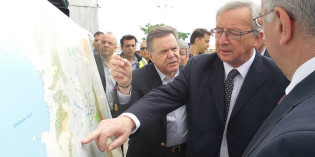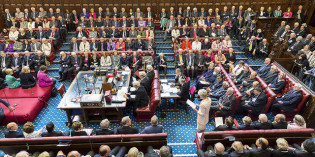Informing and engaging citizens

The Carmichael case shows that we need a stronger public understanding of the key democratic role that election courts perform
Alistair Carmichael, the Liberal Democrat MP who served as the Secretary of State for Scotland in the 2010-2015 Conservative/Liberal Democrat coalition, has survived the court case which threatened to strip him of his Orkney and Shetlands parliamentary seat. Heather Green follows up on her previous article for Democratic Audit, arguing that it is disappointing that public […]

The best of Democratic Audit’s 2015 coverage of the European Union
As always, this year has been an eventful one on the continent, with the Brexit referendum on the horizon and political clashes over the terms of the UK’s membership, as well as a migrant crisis and the Greek crisis. Here, we round up 10 of the best articles on Democratic Audit which focus on the European […]

The 2015 election has been described as the most disproportional ever – but it wasn’t disproportional everywhere
Disproportionality is the degree of mismatch between parties’ shares of votes and their shares of seats, with measures of disproportionality usually calculated for national elections. This year’s general election was criticised by many as the least proportional ever. Chris Hanretty acknowledges that on some measures, this is a valid claim, but demonstrates that calculating a measure […]

The Strathclyde recommendations, if implemented, could give rise to a de facto form of unicameralism
On 17 December, the government published a review by Lord Strathclyde on secondary legislation and the relationship between the House of Lords and the House of Commons. If the recommendations were implemented the House of Lords would lose its power to veto statutory instruments. Mark Elliott outlines three salient matters pertaining to statutory instruments, and, in the […]

A flawed recipe for how to end a war and build a state: 20 years since the Dayton Agreement
On 14 December 1995, the Dayton Agreement was formally signed in Paris, bringing an end to the Bosnian War. On the 20th anniversary of the agreement, Jessie Hronesova assesses five key lessons on peace and state-building processes that can be taken from the Dayton experience. She writes that while inconsistencies and vague formulations in the agreement […]

Dictators don’t necessarily favour cooperation with other authoritarian regimes over democracies
Do the “bad guys” work together? It is often suggested that authoritarian regimes such as China and Russia will work in league with other democracies, but analysis from Philipp Kuntz and Daniel Odinius suggests that, just like some of the world’s leading democracies, authoritarian regimes will be extremely pragmatic in choosing their geopolitical partners. Similar […]

The BBC could strengthen democratic participation by providing integrated and targeted information on elections
The license fee should and does pay for a ‘digital public space’, rather than just broadcast content. Richard Berry argues this is exactly the right approach for a public service broadcaster in the internet age, and outlines how the vision can be made a reality when it comes to the publication of election results. Similar […]

The UK’s ‘Brexit’ referendum represents a victory for the forces of populist Euroscepticism
The UK is currently engaged in a renegotiation of the terms of its membership of the European Union, in advance of an ‘in/out’ referendum which will be held at a to-be-determined date at some point in the next two years. Here, Dr. Chris Gifford argues that the very holding of that referendum represents a victory […]

Recruitment procedures shape the gender composition of party lists in European Parliament elections
Different countries select their Members of the European Parliament in different manners, with Britain opting for a party list system based on regional (in the case of England) and national constituencies (in the cases of Scotland, Wales, and Northern Ireland). The European Parliament has better gender representation than most legislatures, however as Jessica Fortin-Rittberger, Berthold Rittberger, […]

Despite the tax credit U-turn a radical upheaval in support for the working poor is still underway
The government’s decision to scrap tax credit cuts was a welcome move, and (eventually) highlighted the effectiveness of the British political system’s checks and balances. However, Daniel Clegg writes that the abandoned cuts were just one part of a more drawn-out and comprehensive dismantlement of the system of cash support for low-earning households. Tax credit U-turn […]


 Democratic Audit's core funding is provided by the Joseph Rowntree Charitable Trust. Additional funding is provided by the London School of Economics.
Democratic Audit's core funding is provided by the Joseph Rowntree Charitable Trust. Additional funding is provided by the London School of Economics.